|
|
|
Sort Order |
|
|
|
Items / Page
|
|
|
|
|
|
|
| Srl | Item |
| 1 |
ID:
140363
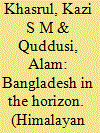

|
|
|
| 2 |
ID:
132052
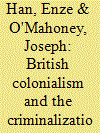

|
|
|
|
|
| Publication |
2014.
|
| Summary/Abstract |
What explains the global variation in laws criminalizing homosexual conduct? Recent research has claimed that British colonialism is largely responsible for the criminalization of homosexuality around the world. This article utilizes a newly constructed dataset that includes up-to-date data on 185 countries to assess this claim. We find that British colonies are much more likely to have criminalization of homosexual conduct laws than other colonies or other states in general. This result holds after controlling for other variables that might be expected to influence the likelihood of repressive lesbian, gay, bisexual and transgender (LGBT) rights legislation. However, we also find that the evidence in favour of the claim that British imperialism 'poisoned' societies against homosexuality is weak. British colonies do not systematically take longer to decriminalize homosexual conduct than other European colonies.
|
|
|
|
|
|
|
|
|
|
|
|
|
|
|
|
| 3 |
ID:
108345
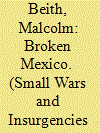

|
|
|
|
|
| Publication |
2011.
|
| Summary/Abstract |
The Mexican drug war, in full swing since December 2006, has now claimed more than 40,000 lives. Dozens of high-level cartel operatives have been captured or killed, yet the leadership of one cartel, from Sinaloa in northwestern Mexico, has remained apparently untouched. The apparent lack of a crackdown on the Sinaloa Cartel has spurred criticisms of the Calderón administration, as well as US authorities aiding in the drug fight - some critics contend that the Sinaloa Cartel has enjoyed protection from the authorities. The Sinaloa Cartel's history of protection and collusion by authorities goes back a long way - during the reign of the PRI from 1929 to 2000, Sinaloa's drug traffickers were allowed to operate with near-total impunity. But mounting evidence - captures and deaths of high-level operatives from Sinaloa as well as arrests of relatives of the leadership - suggests that the claims of collusion against the current Mexican administration are false.
|
|
|
|
|
|
|
|
|
|
|
|
|
|
|
|
| 4 |
ID:
128563
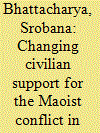

|
|
|
|
|
| Publication |
2013.
|
| Summary/Abstract |
Prolonged domestic political conflicts change over time. The Maoist conflict in India which began in the late 1960s is one such conflict. Over time, the 'old' Maoist conflict has become a 'new' Maoist conflict. Important changes have occurred both in the macro and micro processes of the conflict. Some of these changes include the strategic relocation of the Maoist bases, a shift in the class character of the conflict, the nature of civilian support, and the rebels' methods of operation. While in the 1960s, the conflict was involved in land redistribution with the aim of annihilating class enemies, the recent conflict focuses on caste identities. In addition, it is intrinsically linked with territorial control and local political competition. This has automatically led the Maoists to become involved with local criminal networks and also local business networks based. This involvement has led to financial resources for the conflict. Furthermore, it has forced the local population to become linked with the conflict. Studying these changes is important, especially for counterinsurgency policies.
|
|
|
|
|
|
|
|
|
|
|
|
|
|
|
|
| 5 |
ID:
125153
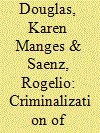

|
|
|
|
|
| Publication |
2013.
|
| Summary/Abstract |
Over the last few decades, and particularly after 9/11, we have witnessed the increasing criminalization of immigrants in the United States. Changing policies have subjected immigrants to intensified apprehension and detention programs. This essay provides an overview of the context and policies that have produced the rising criminalization of immigrants. We draw on the institutional theory of migration to understand the business of detention centers and the construction of the immigration-industrial complex. We link government contracts and private corporations in the formation of the immigration-industrial complex, highlighting the increasing profits that private corporations are making through the detention of immigrants. We conclude with a discussion of how the privatization of detention centers is part of a larger trend in which basic functions of societal institutions are being farmed out to private corporations with little consideration for basic human rights.
|
|
|
|
|
|
|
|
|
|
|
|
|
|
|
|
| 6 |
ID:
179107
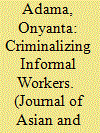

|
|
|
|
|
| Summary/Abstract |
The article examines the criminalization of street vendors in Abuja, Nigeria. It draws on the debate on informality, legality and rights, to highlight the tensions surrounding the law as a mode of regulation. As documented, ideology provides the rationale for the criminalization of street vending. The activity is deemed inimical to the modernist ideals of a clean and functioning city. Enforcement of the law is accompanied by the harassment of vendors. However, vendors remain on the streets by circumventing the law. The article highlights the shortcomings of a simplistic approach to the governance of informality. It cannot be legislated away.
|
|
|
|
|
|
|
|
|
|
|
|
|
|
|
|
| 7 |
ID:
117474
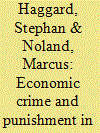

|
|
|
|
|
| Publication |
2012.
|
| Summary/Abstract |
STEPHAN HAGGARD and MARCUS NOLAND describe North Korea's prison system. The system includes not only the infamous penal camps for political prisoners but detention facilities that permit short-run incarceration for economic crimes. They find that those with greater involvement in the market are more likely to face incarceration in such facilities and that the criminalization of economic activity allows the state to extract bribes.
|
|
|
|
|
|
|
|
|
|
|
|
|
|
|
|
| 8 |
ID:
188237
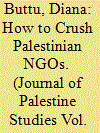

|
|
|
|
|
| Summary/Abstract |
Israel has long sought to erase Palestinians, Palestinian resistance, and Palestinian organizations. In Israel’s latest rendition of erasure, Palestinian nongovernmental organizations (NGOs) have become the new target. By labeling NGO staff, and now NGOs, as “terror-affiliated,” Israel is attempting to silence these organizations by making it impossible for them to be funded. Looking at the case of Mohammed El Halabi from World Vision, one can see that it does not take much for donors to run scared: just using the “t” word is sufficient, with no need for evidence.
|
|
|
|
|
|
|
|
|
|
|
|
|
|
|
|
| 9 |
ID:
143156
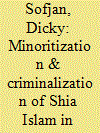

|
|
|
| 10 |
ID:
140362
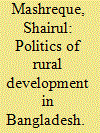

|
|
|
| 11 |
ID:
119508
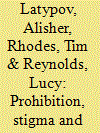

|
|
|
|
|
| Publication |
2013.
|
| Summary/Abstract |
Conscious of a paucity of evidence, and drawing upon a combination of historical documentary material, research literature and surveillance data, this paper offers a commentary on the social, historical and HIV contexts affecting men who have sex with men in Central Asia. The authors describe the history of men who have sex with men in the five Central Asian republics, before, during and after the Soviet-imposed legal prohibition, which continues in Turkmenistan and Uzbekistan, the only nations in the World Health Organization Europe region where sex between men remains illegal. This historical context frames contemporary responses to men who have sex with men. Despite long-established homoerotic traditions, modern attitudes to men who have sex with men are marked by great hostility, generating stigmatization of sex between men and discrimination against men suspected of it. The losses following public exposure can be severe: loss of employment; limited/lack of health-care access; and safety from physical and sexual assault. Such hostility creates an environment of increased HIV risk, and constrains the production of reliable HIV evidence. The authors argue that the generation of HIV risk, HIV-prevention responses and HIV evidence are products of their historical and social contexts, and call attention to the urgent need for HIV prevention and structural reforms to protect the health of men who have sex with men in Central Asia.
|
|
|
|
|
|
|
|
|
|
|
|
|
|
|
|
| 12 |
ID:
121025
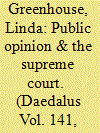

|
|
|
|
|
| Publication |
2012.
|
| Summary/Abstract |
The relationship between the Supreme Court and public opinion remains ambiguous, despite efforts over many years by scholars both of the Court and of mass behavior to decipher it. Certainly Supreme Court Justices live in the world, and are propelled by the political system to their life-tenured positions. And certainly the Court, over time, appears to align itself with the broadly defined public mood. But the mechanism by which this occurs-the process by which the Court and the public engage one another in a highly attenuated dialogue-remains obscure. The Court's 1973 abortion decision, Roe v. Wade, offers a case in point. As the country began to reconsider the wisdom of the nineteenth-century criminalization of abortion, which voices did the Justices hear and to which did they respond? Probing beneath the surface of the public response to Roe serves to highlight rather than solve the puzzle.
|
|
|
|
|
|
|
|
|
|
|
|
|
|
|
|
| 13 |
ID:
134346
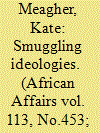

|
|
|
|
|
| Summary/Abstract |
This article explores shifting perspectives on African clandestine economies. Previously condemned as products of clientelism and corruption, clandestine economies are attracting renewed interest for their developmental potential in weak state contexts. Focusing on systems of illicit cross-border trade in East and West Africa, this article shows that more favourable views of clandestine trading activities are driven more by their compatibility with liberal reform agendas than by their positive contribution to local development. Indeed, the optimistic turn in perspectives on illicit African trade glosses over its increasingly negative impact on local security and development. While discourses of violence and criminalization were used to characterize the largely peaceful cross-border trading systems in West Africa in the 1990s, new discourses of hybrid governance and state building are used to frame the more violent and socially disruptive cross-border trading complexes of East Africa in the 2000s.
|
|
|
|
|
|
|
|
|
|
|
|
|
|
|
|
|
|
|
|
|